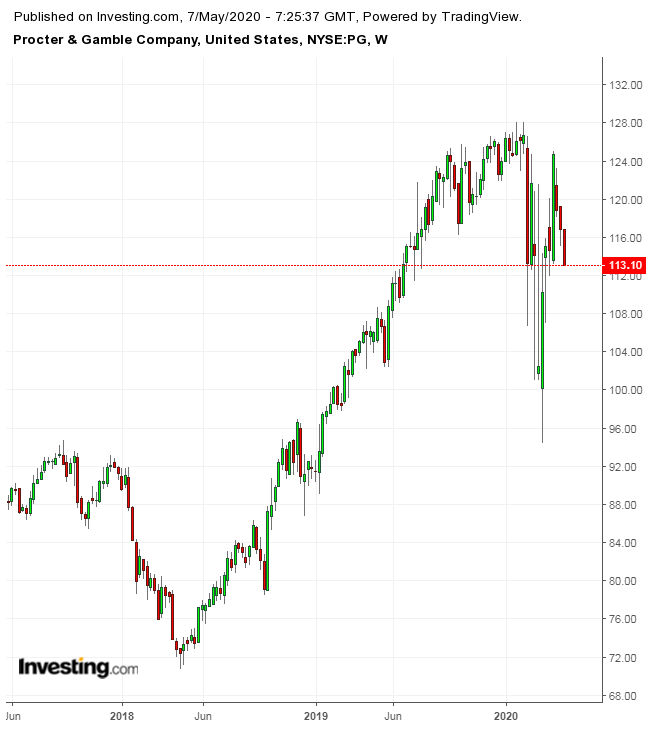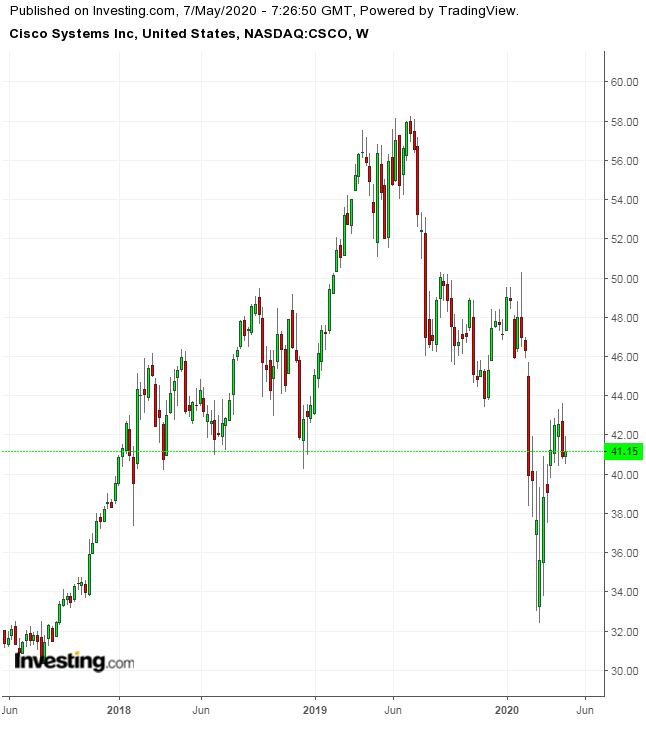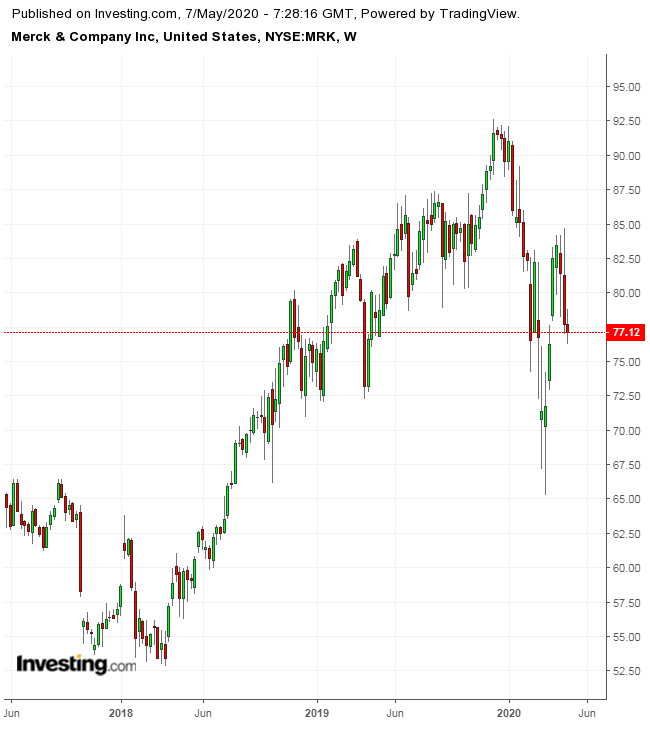At a time when many top rated companies are slashing their dividends in order to survive the economic menace of the COVID-19 pandemic, investors who have their savings tied up in fixed income stocks face an increased level of fiscal uncertainty.
During the past four weeks, a wave of prominent mega caps, across a variety of sectors, have either suspended their dividends, or slashed them dramatically. Those market leading companies include Boeing (NYSE:BA), Ford (NYSE:F) and Royal Dutch Shell (NYSE:RDSa).
While payouts from S&P 500 companies are likely to drop 25% this year according to an estimate by Goldman Sachs, there are still some segments of the market that will buck the trend. We've short-listed three dividend stocks for income-oriented investors. Each is considered a safe choice due to their ample cash reserves, healthy balance sheets and reasonable payout ratios.
1. Procter & Gamble
Consumer staples are an area of the market considered a refuge for investors when the risk of a recession increases. The logic here is simple: while cutting back spending on vacations and other luxury items, consumers are highly unlikely to stop buying things they absolutely need for day-to-day living such as toothpaste and dish-washing soaps.

Procter & Gamble (NYSE:PG), the multinational consumer staple manufacturer, is a stock we recommend when volatility drives markets and investors seek slow but steady capital growth with reliable, regular dividend payments. The company posted a 6% surge in organic sales in the first quarter of this year, helped by a booming demand for Charmin bath tissue and Bounty paper towels amid the COVID-19 spurred buying spree ahead of lockdowns.
The stock yields 2.73% per annum. P&G is among that small group of companies considered Dividend Aristocrats—businesses that have, for 25 years or more, consistently and consecutively raised their dividends. In Procter & Gamble's case that stat is even more impressive: the Cincinnati-based company has paid a dividend for almost 130 years, increasing that payout for 63 consecutive years. It now pays $0.79 a share quarterly after a 6% hike last month.
Shares of P&G have slipped about 8% this year through Wednesday's close. Still, the stock is outperforming the S&P 500 Index which dropped 11.3% over the same period.
2. Cisco Systems
Cisco (NASDAQ:CSCO) is a cash-rich technology player, making it well-positioned to generate enough revenue to continue paying dividends during this economic crisis.

The San Jose-based networking giant is the world's largest producer of routers, switches and other gear that companies use to connect computers. While the cyclical nature of this segment of the hardware market could continue to pressure the performance of Cisco’s stock, it’s nonetheless difficult for companies across all segments to delay their capex investments indefinitely, including for products that are so crucial for their tech infrastructures.
An additional reason we're fairly bullish about Cisco’s ability to pay dividends: the company’s aggressive diversification drive away from hardware to a software-driven model within new, high-growth areas of the market, such as cybersecurity, applications and services.
Under Chief Executive Officer, Chuck Robbins, Cisco has made a string of acquisitions in order to build a software and services business. Last year, Cisco bought closely held Voicea, a maker of software that provides real-time transcription and voice search capabilities. In July, it agreed to acquire Acacia Communications (NASDAQ:ACIA) for about $2.6 billion, gaining chips and machines that help translate optical signals into electronic data.
These growth initiatives, coupled with the company’s dominant position in the Americas region, where it generates the majority of its sales, have positioned the company to outperform when the macroeconomic risks decrease.
In addition to growth, Cisco is also a reliable dividend payer. Though not yet considered an Aristocrat, given it has only been paying a dividend for 11 years, Cisco has nonetheless raised its payout every year, making it an attractive option for those seeking growing income. With a current annual yield of about 3.5%, investors are getting a quarterly payout of $0.36 a share, which has risen 14.20% per year during the past five years. As well the payout ratio on Cisco's dividend is 50%, meaning there's quite a bit more room for dividend hikes in the future.
3. Merck & Company
Healthcare stocks are considered solid income producers. Just like retailers, utilities and garbage collectors, healthcare providers offer services that remain necessary even in a recession. Plus, economic swings don’t typically curb the roll-out of new drugs and devices.

Stocks like Merck (NYSE:MRK) are well positioned to not only beat the market in any downturn, but also provide good sustainable returns. The company is currently benefiting from the success of its top-selling cancer drug Keytruda. Analysts expect Keytruda sales to reach $20 billion a year by 2023, according to FactSet, generating more than a third of total company sales by that time.
The drugmaker last week reported an 11% increase in sales for the latest quarter, driven by strong growth in Keytruda.
With powerful earnings momentum, a growing dividend and share buybacks, we believe the company is a good long-term bet for those seeking rising payouts. The stock currently yields 3%, via its quarterly dividend of $0.61 a share. The drugmaker last year boosted its payout by 11%. And with a lower-than-average, payout ratio for the sector of just 43.06%, there's a long runway for additional increases.
Bottom Line
Healthcare, consumer staples and solid tech names are three defensive areas of the market that are havens for income-oriented investors in this market turmoil. Though the stocks are unlikely to offer huge capital gains, they remain dependable sources of steady fixed income.
